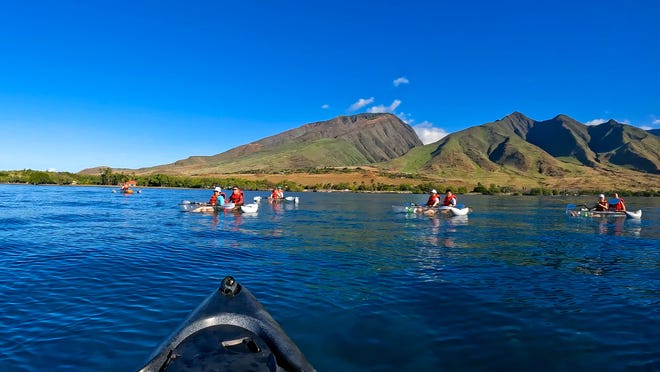
Each morning, Jason and Sabrina Rosenbloom anticipate waking up to new cancellations for their Maui-based eco-friendly kayaking tour company, Gabriel’s Ohana.
Named after the couple’s youngest son, Gabriel, the small family-run business has lost more than 95% of its bookings since the devastating West Maui fires that started on Aug. 8 and left more than 100 people dead, thousands missing and the historic town of Lahaina in ashes.
Before the fires, the family would operate full tours of 20 guests at about eight to 10 bookings a day. As of Monday, the business has done only two tours.
In the immediate aftermath of the fires, tens of thousands of tourists evacuated the island. Social media messaging soon told tourists “to not travel to Maui” so resources could be used for residents who lost everything.
People heeded the call. Images and videos on social media show Maui’s once-bustling – and arguably overcrowded – resorts and beaches nearly empty. To many, it’s reminiscent of the COVID-19 shutdown. The week after the fires, Maui hotel occupancy rates dropped 27.6%. Over the past week, daily passenger arrivals to Maui dropped 80%.
Learn more: Best travel insurance
It’s all causing a strain for locals who depend on tourism.
“With the unexpected and quick shutdown of the island, our whole household is now without an income,” Sabrina Rosenbloom said.
Now, a few weeks later, many people – including Hawaii Gov. Josh Green – are pleading for visitors to come and support Maui’s economy.
Though West Maui, including Lahaina, Napili, Kaanapali and Kapalua, remain closed, the Hawaii Tourism Authority “encourages travelers” to visit other areas of Maui, like Hana and Kihei.
Some tourists are ready to step up and help Maui’s local businesses in need, but it’s complicated to travel to a place where devastation and loss of human life recently occurred. Meanwhile, at stake are the livelihoods of many Maui locals because the island is so dependent on tourism.
“Things are going to be dire soon if travelers don’t return quickly,” she said. “What’s worse, we have the ability and resources to employ numerous people who have lost jobs due to the fire, but now there is not enough work to help our own family, let alone our neighbors.”

If Gabriel’s Ohana continues to suffer, the family will default on the loans they took out for their business, won’t make their bills and could lose their home, Jason Rosenbloom said.
More:How many people died in Maui fires? Officials near end of search for wildfire victims
Is it time for tourists to return to Maui?
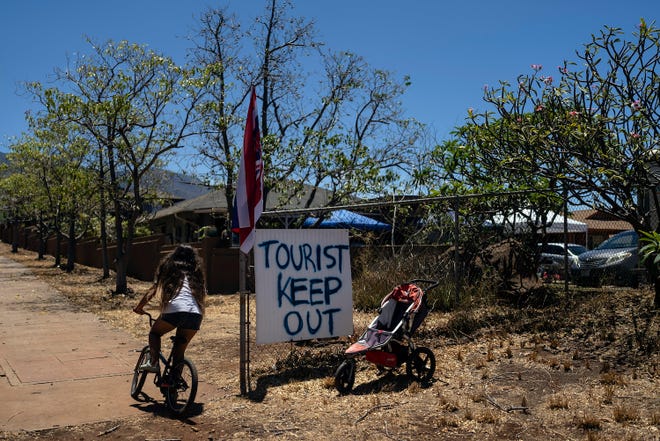
Many people are wondering if they should continue with their upcoming trips to Maui. Some have voiced concerns about feeling strange being at hotels alongside families who lost their homes. They worry they’ll be treated poorly in a place with a contentious history with overtourism. Others just canceled their trips altogether.
Some locals and Hawaiians continue to criticize the idea of vacationing on Maui right now.
“First and foremost, we need to acknowledge that what happened was tragic and we can’t pretend that that didn’t happen,” said Ilihia Gionson at the Public Affairs Office of the Hawaii Tourism Authority. The loss from the deadly inferno is difficult to measure and includes many lives, historical and cultural sites and families’ homes.
“The two most important things to pack on a trip to Maui at this time are patience and grace, understanding that people have lost a lot,” Gionson said. “It’s a balance, right? If you just lost your house, we don’t want you to lose your job, too. And there are going to be some people who aren’t ready to return to work.”
HTA is letting the Maui community take the lead on what it needs to heal. The agency has been hosting community gatherings in West Maui, asking its residents “to define what recovery looks like, rebuilding looks like, to the extent that tourism is involved,” Gionson said.
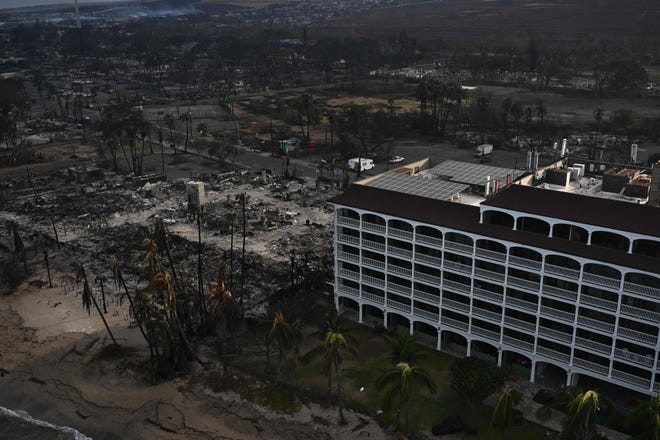
Tourists “should respect the ask from the community to give them their space and give them some time,” he said.
Lisa Tam-Hoy Robbins, a Native Hawaiian entrepreneur whose grandfather is from Maui, says asking visitors to spend their dollars at local businesses goes beyond just tourism; it’s everyone coming together to support Maui and its people.
“This is how we should approach this matter: Kako’o a Kokua,” she said, referencing the Hawaiian words meaning to “uplift and help selflessly.”
How tourists can support Maui
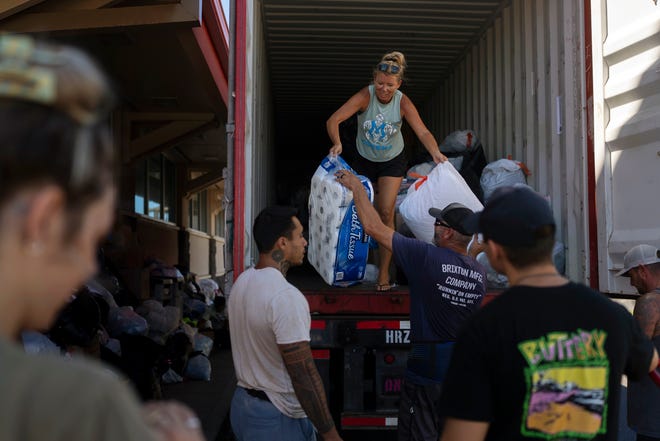
Gionson said encouraging the return of tourism to Maui – with an emphasis on supporting local – is also driven by wanting to avoid “a widespread economic disaster like what we saw during COVID.”
The agency is working on a resource for people to see which businesses are open and asking for patrons.
About 70% of every dollar generated in Maui comes from tourism, according to the Maui Economic Development Board. Visitor spending contributed $14 million to Maui’s economy in 2019, millions more than Kauai and Hawaii Island and just slightly behind Oahu.
Economists called for Hawaii to diversify its economy after the pandemic revealed just how reliant the state is on tourism. There is currently no federal or state relief for Maui businesses affected by the fires, although Jason Rosenbloom is hoping the government would cover employee wages for job seekers and payouts to assist small businesses.
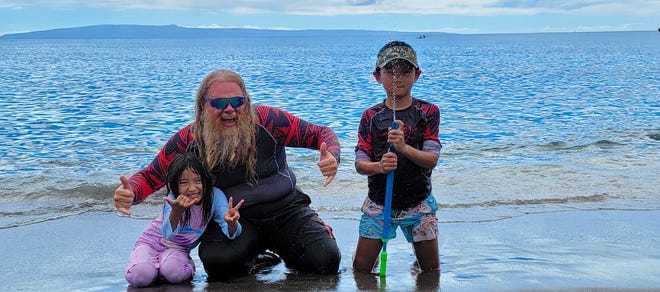
‘We need responsible tourism and we need it yesterday’
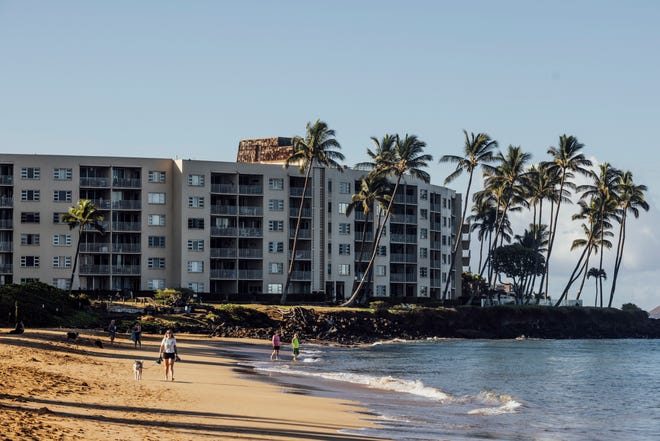
Tina Toles has a special place in her heart for Maui – she has been there more than a dozen times. The Alabama hairdresser has a trip planned for January to stay in Kaanapali and felt “devastated” when she learned of the fires. Friends who live in Maui told her to still visit.
“It’s kind of a Catch-22,” Toles said. “I feel so sorry for (the Maui community) because it’s a very hard situation. This time, when I go, it’ll be a whole lot different though.” She said she plans on volunteering and patronizing only local businesses when she’s there.
“We’re not going to get a lot of souvenirs. We’re going to be double-tipping and looking for places to donate,” she said.
Rosenbloom said it’s a “butterfly effect” if people come to Maui, enjoy themselves and spread the word back home. “They need to learn about aloha, so they take it back to their world,” he said.
Garrett Marrero said he has seen layoffs at Maui hotels and boat companies in the few weeks since the tragedy. As co-founder of Maui Brewing Company, which has three locations on Maui, Marrero said the company is also considering rightsizing. The brewery’s Kihei location has stayed open and recently had two of its slowest days since the beginning of the pandemic.
Like many other local businesses, Maui Brewing Company had its boots on the ground to help with urgent needs, like using its Kaanapali location as a community kitchen. Now, it’s shifting its focus back on reopening as “a place to get some good food and grab a beer, gather together and support each other.”
“We need responsible tourism and we need it yesterday,” he said, urging people to volunteer while here or donate to local charities.“If you’re thinking about coming and you’re wondering if it’s a good time, you’re already starting down the journey to being responsible.”
Kathleen Wong is a travel reporter for USA TODAY based in Hawaii. You can reach her at [email protected]






